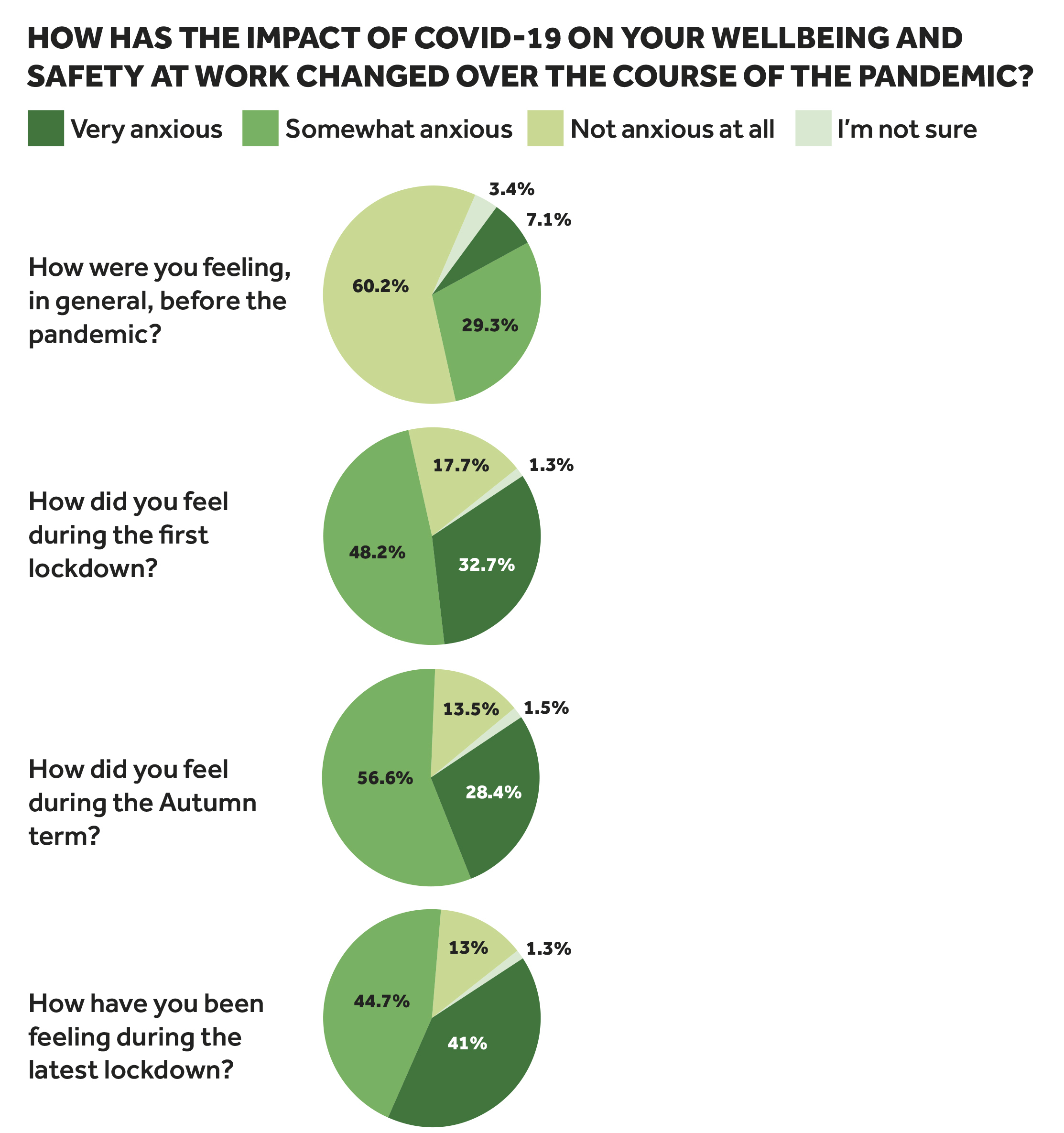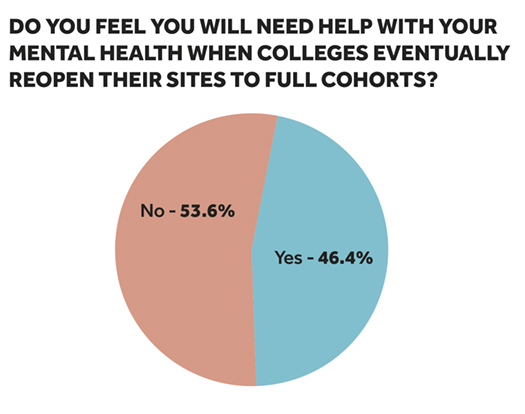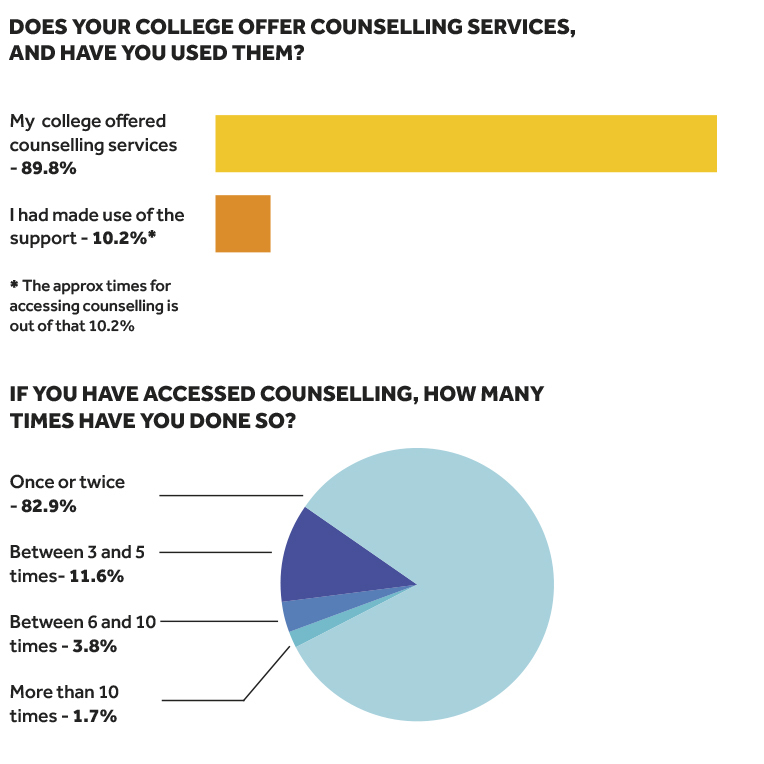Mental health: Support staff report surge in anxiety

Most support staff in colleges across the UK have suffered high levels of anxiety during the latest lockdown, a new survey from support staff union Unison reveals.
In the survey, shared exclusively with Tes, 85.7 per cent of support staff said they felt either “very anxious” or “somewhat anxious” during the current lockdown. This is a significant increase to pre-pandemic levels, when almost 60 per cent said they did not feel anxious at all.
When it came to workload linked to the pandemic, 77.7 per cent reported feeling “very anxious” or “somewhat anxious” during the current lockdown. Pre-pandemic, over half (56.7 per cent) said they did not feel anxious at all about their workload.

Around 1,500 college support staff participated in the survey, with the majority in a learning support or administration role.
Need to know: Ofsted plans some full inspections in the summer
Meet Jon Richards: The man speaking up for support staff
Background: 3,100 college staff put at risk of redundancy
Covid and mental health: College support staff ‘anxious and afraid’
A technician working at a UK college told Tes that they felt “anxious and afraid” about the return to college.
The staff member, who wanted to remain anonymous, said: ”[My] anxiety has increased and worsened mainly because of lack of support and involvement from the college. For four weeks I sat on my inbox while nothing happened. It took ages to finally get a more powerful PC to work from home effectively. There was a crushing sense of being sidelined. The worst shock was finding out I’d been furloughed for the second time, and each time I hadn’t a clue it had happened.
“The first I heard about the second furlough was when it was ‘joyfully’ announced by my manager [asking me] to come into college on 1 March. This was only a few days after my vaccination. The ridiculousness was that HR had already quizzed staff twice about whether they were clinically vulnerable, etc. They are still ignoring my requests for furlough dates and risk assessments. One starts to wonder if I’ll be out till the end of the year because no one’s competent to risk-assess properly.”
They added: “Mental health-wise, it should improve if/as I get more involved. What is unnerving is not hearing about what’s being planned and that I’m not asked about it or to contribute. This is a culture of managers telling and not asking - it’s alienating living in the mushroom shed.”
When asked if they felt safe from Covid, they said: “Barely, there are rooms with no real ventilation. There’s a real sense of things are just like the last time. The best was having to work with a bone-fide Covid denier/anti-masker who definitely could not be trusted.
“The testing regime is a Boris farce and the facilities manager/health and safety lead is perceived to be unreliable. Student covid compliance went down by Christmas and there are too many students on-site for the space available.”
‘Traumas are often going untreated’
Unison’s head of education Jon Richards, said that “clearly” the mental health support provided by colleges was falling short.
“It’s worrying that staff anxiety has grown during the pandemic. The assistance being offered should be more than a series of well-meaning gestures or box-ticking exercises,” he said.
“While support workers are helping students cope with the massive emotional and educational disruption of this year, their own traumas are often going untreated.
“Many staff have worked on-site throughout the pandemic. That’s meant coping with the constant threat of contracting the virus, leaving staff scared, not just for themselves but for their families and students, too. Colleges need to do more to support staff who’ve been pushed to the brink by the demands being made on them.”
Support staff mental health: Are colleges doing enough?
Around 46 per cent of survey respondents said they thought they would need help with their mental health when colleges were fully open to all students.

A third (35.6 per cent) either strongly disagreed or disagreed that leaders and managers created space for them to raise mental health issues and gave permission to talk about issues affecting them (including non-work issues). Over 28 per cent either strongly disagreed or disagreed that the support on offer in respect of mental health and wellbeing was appropriate for their needs.
However, over nine in 10 staff said their college offered a confidential helpline, a similar proportion said it offered counselling services, and 91 per cent said it offered an exercise class or support for other physical exercise.
Around one in 10 accessed counselling on offer, with the overwhelming majority (82.9 per cent) having used counselling support once or twice, and 11.6 per cent accessing it between three and five times.

Association of Colleges: ‘Always more to be done’
Richard Caufield, area director and mental health lead at the Association of Colleges, said staff mental health needed to be a vital part of a college’s whole-institution approach to tackling mental health.
“A recent AoC survey found all colleges have structures in place to support staff with their mental health, with over two-thirds of colleges providing counselling, and 90 per cent of colleges running wellbeing sessions,” he said.
“However, there is always more to be done and we continue to work with the government to take forward the work from the expert advisory group on staff wellbeing. We also work with charities such as Education Support who are focused on staff mental health and wellbeing, and through our awards programme where the criteria for the NOCN Beacon Award for mental health and wellbeing includes a focus on staff mental health.”
A DfE spokesperson said: “We recognise college staff across the sector have gone above and beyond during the pandemic to make sure learners are supported to continue their learning. The return to onsite learning is a testament to their hard work and resilience during what has been a very difficult time for everyone.
“We are working with colleges and the FE sector to make sure staff and learners have access to the mental health and wellbeing support they need. Our Wellbeing for Education Return programme is bringing health experts together with education staff to respond to anxieties and concerns they may be facing.”
You need a Tes subscription to read this article
Subscribe now to read this article and get other subscriber-only content:
- Unlimited access to all Tes magazine content
- Exclusive subscriber-only stories
- Award-winning email newsletters
Already a subscriber? Log in
You need a subscription to read this article
Subscribe now to read this article and get other subscriber-only content, including:
- Unlimited access to all Tes magazine content
- Exclusive subscriber-only stories
- Award-winning email newsletters